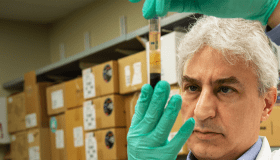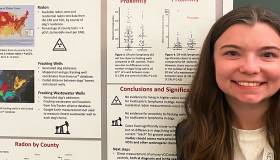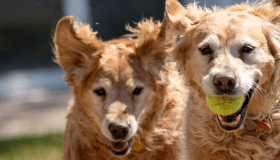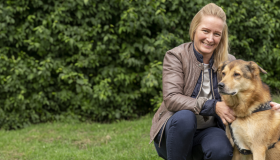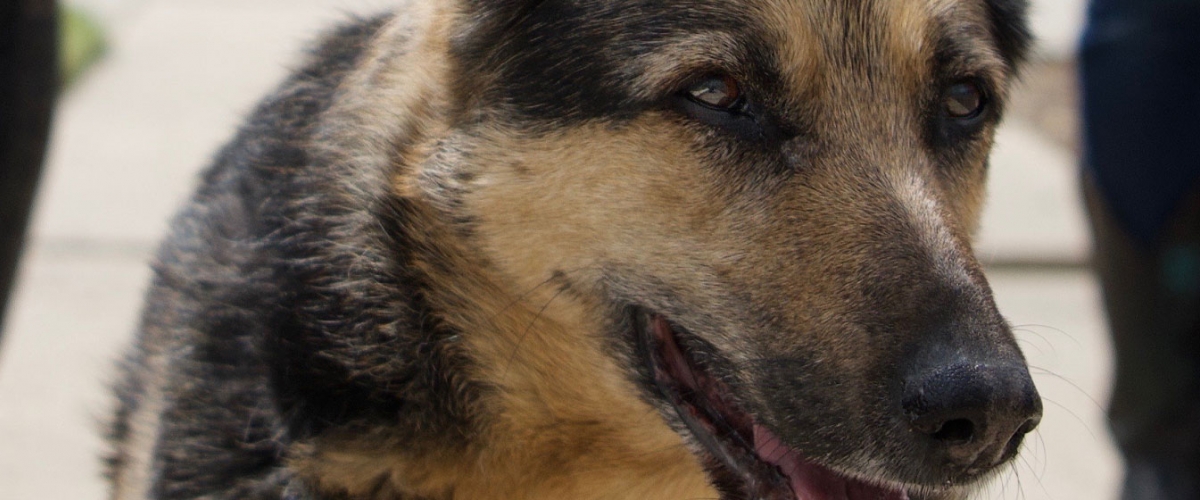
May 23, 2019 – Kathryn Holm is a donor to Morris Animal Foundation and passionate about animals everywhere, especially her rescue dogs, Bocca and Nina, both 11 years old. Kathryn has long been an advocate for the Foundation’s work, but the impact of that work hit close to home recently and made her appreciate even more all the Foundation has done to advance animal health.
In February, Kathryn noticed her dog Nina was limping and seemed to have an infected nail on her right foot. Nina had surgery to remove the toenail and went home with a cone around her neck and a wrapped foot. But the toe did not seem to be getting better.
Kathryn took Nina back to her veterinarian. The toe was infected and not healing, and the decision was made to remove the toe. The veterinarian sent the toe to a veterinary pathology lab, and the report came back with bad news. Nina had a very aggressive form of melanoma. In dogs, the nailbed is a common place for melanomas to begin.
Nina was referred to a veterinary oncologist, Dr. Robyn Elmslie, at the VRCC Veterinary Specialty and Emergency Hospital in Denver. Fortunately, Dr. Elmslie practices at the cutting edge of veterinary cancer treatment. In fact, the treatment recommended for Nina – a canine melanoma vaccine – was one that Morris Animal Foundation has supported with research investments. And the adjunct therapy that became part of Nina’s treatment, Vitamin D supplementation, also was investigated with funding from Morris Animal Foundation.
“When I went to see Dr. Elmslie, and she explained the treatment plan, I knew that this was work that Morris Animal Foundation had funded,” said Kathryn. “I never really expected to benefit so directly from the Foundation’s research, but it really drove home how the Foundation impacts people and their pets every day.”
First, though, was Nina a good candidate for this treatment? Fortunately, the cancer seemed to have been caught early and had not metastasized to the lymph nodes or lungs. For that, Kathryn was relieved because if caught later, the treatment options would have been more limited. Early diagnosis meant that Nina was eligible to receive the canine melanoma vaccine, which was delivered in four doses. Nina also had her Vitamin D levels tested to determine if she should be receiving supplementation. Research funded by the Foundation showed that optimal levels of Vitamin D may improve the effectiveness of cancer therapy and recovery.
Now post-treatment, Nina is doing well. Her life expectancy without treatment was no more than six months. With treatment, she may live up to another two years, a full life for a German shepherd.
“That would be almost 14 years old, which isn’t too bad,” said Kathryn. “Nina and Bocca are such an important part of my family; they brighten my life every day. I’m just so grateful to be able to have this extra time with Nina, and grateful, too, that she can continue to enjoy a good quality of life and still annoy her sister!”
Thanks to cancer research funded by Morris Animal Foundation, Nina has a new lease on life. But we still have so much more work to do. There are cancers that we haven’t been able to advance treatments for as rapidly as we would like – including osteosarcoma and the deadly hemangiosarcoma – and we need your help to give the gift of a life to more animals everywhere. Please consider making a gift today.

